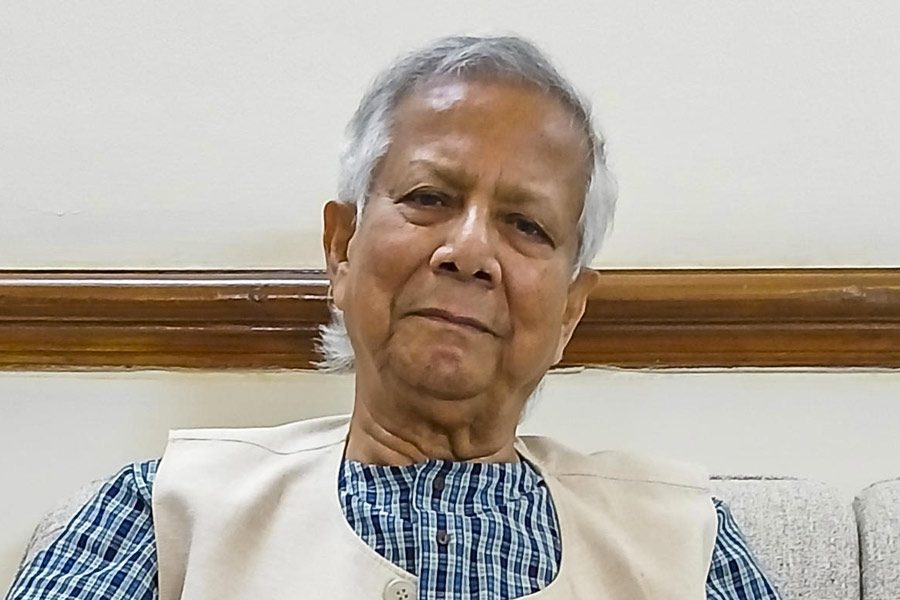The Muhammad Yunus-led interim government in Dhaka last month scrapped the mandatory physical inspection of imports from Pakistan, it has emerged amid the flutter in the Indian security establishment over the resumption of direct maritime links between Bangladesh and Pakistan.
Observers have interpreted the move by the National Board of Revenue (NBR), the apex tax administrator in Bangladesh, as an attempt to clear the decks for the unbridled entry of items from Pakistan.
While the NBR has described the move as a step towards the prompter release of consignments, an observer said it would increase the possibility of contraband items entering Bangladesh.
“A blanket relaxation of any inspection of imported items doesn’t augur well in view of the present situation in Bangladesh, which has seen a rise in extremism and attacks on dissenters and religious minorities since the fall of the Sheikh Hasina government,” an Indian observer said.
Bangladesh has suffered a virtual breakdown of law and order in the past few months. Hundreds convicted of terror and other grievous charges have escaped from prisons. The country has witnessed multiple incidents of the loot of arms and ammunition from the law-enforcing agencies, including the elite Special Security Force, tasked to protect the Prime Minister, President and the Chief Adviser.
“Arms and ammunition are freely available in today’s Bangladesh, which has seen the sudden rise of private militia groups owing allegiance to extremist forces,” Asad Noor, an exiled Bangladeshi blogger who has been critical of both the Hasina and Yunus governments, told this correspondent from an undisclosed location.
Speculation is rife about the nature of the consignments carried by the ship from Karachi that docked in Chittagong on Wednesday. Friday’s edition of The Telegraph reported the resumption of direct maritime connectivity between the two countries.
“Some large containers, the first to be off-loaded, were still lying in the dock today (Friday) under heavy security.… The possibility that they contain contraband items cannot be ruled out,” a Bangladeshi source said.
Amid the political uncertainty and crumbling law and order, the demand for illegal arms — among the rich and powerful and the new political class of students and Islamists — has shot through the roof.
“Extremist outfits like the Jamaat-ul-Mujahideen Bangladesh and the Hizb ut-Tahrir have always looked towards Chinese or Pakistani suppliers for their contraband items.… Now, if ships from Pakistan reach the ports and their consignments are cleared without scrutiny, you can gauge the risk,” an Indian observer said.
“This poses a threat to India as these outfits have operatives in our country as well.”
Historically, Bangladesh has had a complex relationship with Pakistan since its birth as a country in 1971 after a nine-month Liberation War.
Their ties hit rock bottom over the last 16 years when Bangladesh was ruled by Sheikh Hasina, who had imposed severe tariff and non-tariff barriers that slammed the brakes on trade.
But the bilateral relationship has taken a U-turn since Yunus took over as Chief Adviser to the interim government. The Peace Nobel winner met Pakistani Premier Shehbaz Sharif on the sidelines of the UN General Assembly in September and expressed eagerness about deepening ties with his country.
Around the same time, Mohammed Touhid Hossein, foreign affairs adviser to the interim government, made it clear that Bangladesh was keen on having normal relations with Pakistan.
The trajectory of the Dhaka-Islamabad bonhomie over the last couple of months indicates that the two capitals have made significant progress in their joint pursuit of warmer ties, especially in defence procurement, which has been a concern for India.
Pakistan has begun the process of delivering 40,000 rounds of ammunition, apart from 2,000 units of tank ammunition, 40 tonnes of RDX explosives and 2,900 high-intensity projectiles to Bangladesh, a source in Dhaka confirmed.
“Pakistan’s influence on all aspects of daily life has begun growing since the Yunus-led regime is pro-Pakistan and anti-India,” Noor said.
“We saw Muhammad Ali Jinnah’s birthday being observed at the PressClub, but BangabandhuMujibur Rahman’s pictures were removed from government offices. Qawwaliprogrammes have become common. It seems that people have forgotten the atrocities committed by West Pakistan on the then East Pakistan.”
A source in Islamabad said the Pakistani establishment was excited about the new chapter in the bilateral relationship, which had been “severely affected” as Hasina “was stuck in 1971”.
“Professor Yunus is well respected in Pakistan and our leadership is looking forward to forgetting the past and starting a new chapter,” the source said, adding that Yunus and Shehbazhad had two meetings on the sidelines of COP29 in Baku, Azerbaijan.
A veteran business journalist in Dhaka said that while some in Bangladesh may be excited about what they feel is a fresh beginning, the reality is different.
“The Islamists may be happy but the question is, what will we get from Pakistan?” he said.
He added that the two countries did not even have direct flight connectivity.
“Recently, Pakistan waived visa fees for Bangladeshis expecting a surge in travel, which didn’t happen,” he said.
“Various types of cotton and varieties of stones are our major imports. For everything else, from green chillies and onions to chemicals and computers, we depend on India. I don’t see any possibility of trade picking up.”











